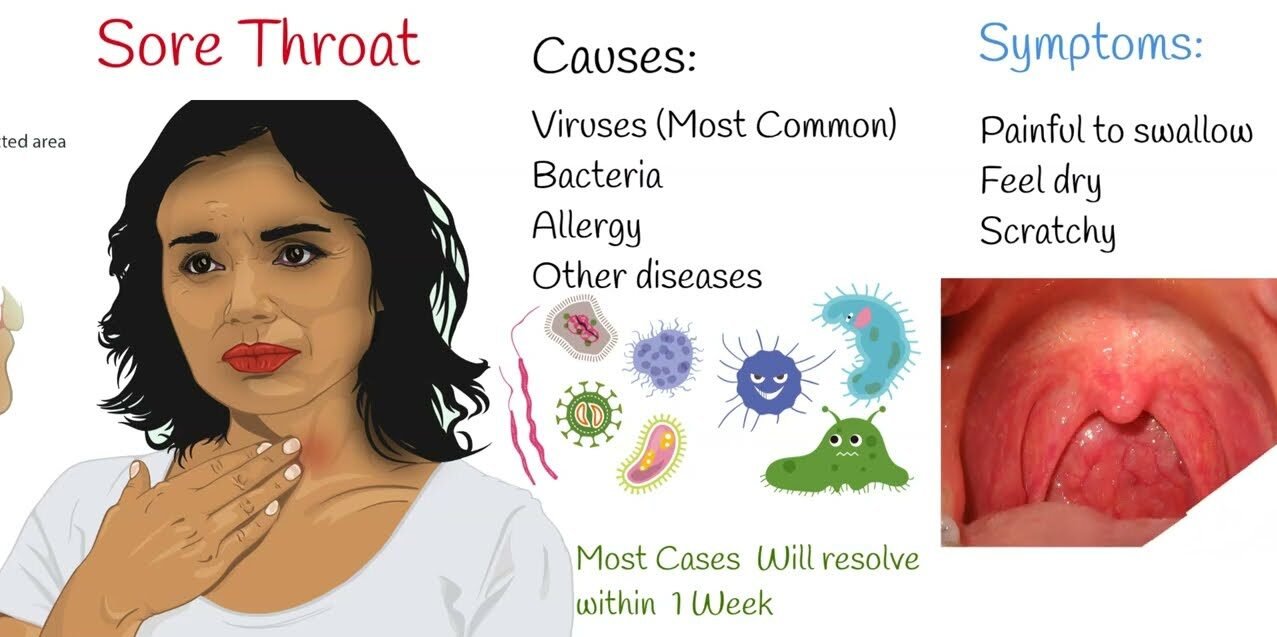A sore throat is one of the most common health issues we all face, often bringing discomfort, irritation, and pain. But what exactly causes it? When should you worry? And what can you do at home for relief? Let’s explore everything you need to know.
What Is a Sore Throat?
A sore throat refers to pain, irritation, or a scratchy feeling in the throat, especially when swallowing. You may feel dryness, discomfort, or itching — all signs that your throat’s mucosal lining (the soft pink inner layer) is inflamed or damaged.

Causes of Sore Throat
Non-Infectious Causes
These occur without any bacterial or viral infection and are generally due to:
-
Smoking or exposure to secondhand smoke
-
Breathing polluted air
-
Dry indoor air (especially with heater use in winter)
-
Excessive talking or shouting
Infectious Causes
In most cases, a sore throat is caused by infections:
-
Viral infections: Rhino virus, Adeno virus, Influenza, RSV, Parainfluenza, or even Coronavirus
-
Bacterial infections: Although less common (0.5%–2%), they can be more severe
Symptoms of Sore Throat

Viral Sore Throat
Viral infections are usually mild and resolve within 7 days. Symptoms include:
-
Nasal congestion
-
Sneezing
-
Dry cough
-
Hoarseness of voice
-
Mild body aches
-
Low-grade fever (occasionally high with influenza or COVID)
Bacterial Sore Throat
Bacterial infections are more intense and may cause:
-
High-grade fever
-
Difficulty swallowing
-
Sharp throat pain
-
Red, inflamed throat
-
White patches on tonsils
-
Swollen neck glands (lymphadenopathy)
-
Bad breath
-
Headache or facial pain
-
Drooling in children due to inability to swallow saliva
-
Yellow nasal discharge
-
Absence of cough in some cases
Can a Sore Throat Be Dangerous?

Viral Sore Throat
Usually harmless and resolves on its own within a week. Severe complications are rare except in cases like:
-
Influenza
-
COVID-19
Bacterial Sore Throat
If left untreated, bacterial sore throat can lead to serious issues:
-
Tonsillar abscess
-
Ear infections (Otitis media)
-
Mastoiditis
-
Pneumonia
-
In children (especially ages 3–15), it can even lead to:
-
Rheumatic heart disease
-
Glomerulonephritis (kidney damage)
-
Who’s at Higher Risk of Complications?
-
Newborns and infants (0–1 years)
-
Children between 3–15 years
-
Elderly above 60 years
-
People with compromised immunity due to cancer, liver/kidney disease, or chronic illness

How Long Does the Cough Last?
Post-viral sore throat often leads to a dry cough that may linger for 3–4 weeks, sometimes even up to a month. This doesn’t usually require antibiotics and can be managed with:
-
Cough suppressants
-
Warm fluids
-
Steam inhalation
When to See a Doctor?
You should consult a doctor if any of the following occurs:
-
Sore throat persists for more than a week
-
Difficulty swallowing
-
Intense throat pain
-
Affected child or elderly person
-
White or red patches in the throat
-
Severe facial or head pain
-
Drooling in children
-
Swollen lymph nodes in neck
-
Bad breath
-
Severe toothache or earache
Should You Take Antibiotics?
Many people resort to Azithromycin without a prescription, assuming it will help. But here’s the truth:
-
98% of sore throats are viral, and antibiotics won’t help
-
Taking unnecessary antibiotics increases resistance and risks complications
-
If it’s truly bacterial, seek a doctor’s advice — don’t self-medicate
Effective Home Remedies for Sore Throat

1. Stay Hydrated
Drink plenty of fluids, especially warm ones like herbal teas or warm water with honey and lemon.
2. Honey & Ginger Paste
Mix grated ginger with honey and consume 3–5 times a day. It soothes the throat and reduces inflammation.
3. Warm Saltwater Gargle
Gargling with lukewarm saltwater 2–3 times a day helps relieve throat pain and kill bacteria. Avoid this remedy in small children.
4. Use Lozenges or Hard Candy
Sucking on throat lozenges or hard candies helps keep the throat moist and eases discomfort.
5. Maintain Humidity Indoors
Dry air can worsen your sore throat. Use a humidifier or keep a bowl of water in rooms with heaters to add moisture to the air.
6. Get Plenty of Rest
Resting gives your body the energy to fight off infection and boosts immunity.
Things to Avoid with a Sore Throat
-
Smoking or being around smokers
-
Talking loudly or straining your voice
-
Acidic fruits like oranges and grapefruits
-
Hard-to-swallow or spicy foods
-
Dehydration
Summary: Key Takeaways
-
Most sore throats are viral, not requiring antibiotics
-
Children, elderly, and immunocompromised individuals are at greater risk
-
Seek medical help if the sore throat is severe, long-lasting, or has warning signs like white patches, swollen glands, high fever
-
Stay hydrated, rest, and use natural remedies to speed up recovery
-
Avoid self-medication with antibiotics unless prescribed by a doctor